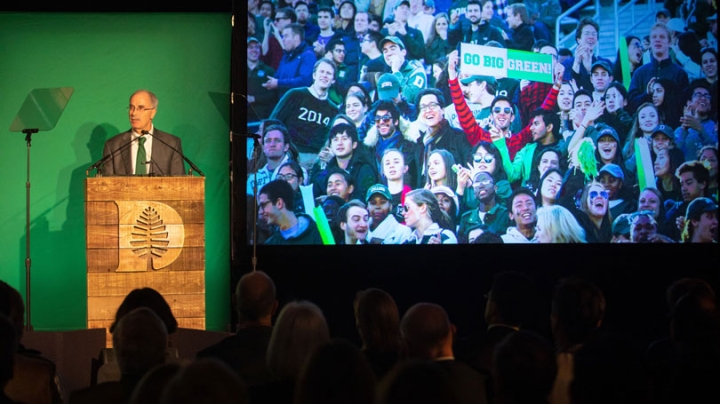A series of gifts from alumni and parents will make the dream of a Dartmouth education possible for dozens of undergraduates annually and prepare generations of global health leaders, President Philip J. Hanlon ’77 announced at two campaign celebrations in Texas this week.
At Wednesday’s gathering in Houston, the president announced an anonymous $22 million bequest intention dedicated to financial aid, a top priority of The Call to Lead campaign. In today’s dollars, this planned gift would provide endowed financial aid funding for up to 44 undergraduates every year.
“This extraordinarily generous gesture will help ensure that we are able to bring the best and brightest to Dartmouth forever,” said President Hanlon. “It is an investment that represents a vote of confidence and trust in our future and the future of our students.”
Donors have endowed 165 scholarship funds during The Call to Lead. Dartmouth aspires to have 250 scholarships endowed by the end of 2019, the College’s 250th year.
Forty-eight hours earlier, in Dallas, the president announced gifts from four families, totaling $7 million, to broadly prepare global health professionals and improve the health of people living in vulnerable communities around the world.
These gifts have put Dartmouth more than halfway toward a $12-million fundraising target to endow the Center for Global Health Equity. The center will improve health globally through a combination of academic programs on campus and experiential training in the field that produces future health care leaders.
In total, alumni, parents, and friends have committed more than $2 billion to The Call to Lead: a Campaign for Dartmouth. With a fundraising goal of $3 billion, the campaign is the most ambitious fundraising effort in the College’s 250-year history.
Bequests and Financial Aid
Bequests, trusts, and other forms of planned giving are essential elements of the campaign and building blocks for Dartmouth’s long-term financial well-being. Bequest intentions made during the campaign exceed $260 million.
The full campaign goal for financial aid is $500 million. Nearly half of all Dartmouth undergraduates receive financial aid, and the average individual award is currently more than $53,000. As part of the campaign, the College intends to:
- Eliminate the need for loans from financial aid packages and reduce the burden on low- and middle-income families
- Expand need-blind admissions to foreign citizens
- Provide financial aid for foreign study and other off-campus programs, so all students can participate in the full Dartmouth experience
- Recruit talented graduate and professional school candidates through competitive fellowships
Global Health Leadership
The Center for Global Health Equity will coordinate and expand several initiatives launched by the Dickey Center for International Understanding and Geisel’s Center for Health Equity in recent years. These programs have supported health research for both undergraduates and graduate students and have established partnerships in locations as varied as Tanzania, Kosovo, and Peru.
“These programs feature experiential learning in an international setting. They train health leaders who are sensitive to culture, political climate, and economic conditions,” said President Hanlon.
The center will leverage students’ growing interest in global health, with 10 percent of all incoming undergraduates and 30 percent of Geisel School of Medicine students citing it as a major interest. The center’s initiatives will include:
- Offering 20 global health equity internships annually, which will help prepare students for lives of wise leadership.
- Expanding the Dickey Center’s Global Health Policy Lab, which combines multidisciplinary classroom learning and health policy internships.
- Broadening opportunities for off-campus learning experiences—in the Upper Valley, elsewhere in the U.S., or abroad.
- Growing programs that send Geisel students abroad and bring international medical students to Hanover.
Published Research and Defense Contracts
At the Dallas and Houston celebrations, two pairings of young alumni and faculty highlighted examples of research where undergraduates were active participants, made possible by Dartmouth’s distinctive model of education.
Katie Clayton ’18, currently a predoctoral fellow in Dartmouth’s Department of Government, and John Carey, a professor of government and the John Wentworth Professor in Social Sciences, talked about a book they have co-authored, soon to be published by Cambridge University Press. Their book, Campus Diversity: The Hidden Consensus, also co-authored by Yusaku Horiuchi, the Mitsui Professor of Japanese Studies, explores student and faculty views of diversity, using novel techniques to measure attitudes. The book concludes that campus communities tend to be less divided on issues of diversity than they are often portrayed in the media.
“Working with Professor Carey and Professor Horiuchi was one of my most valuable learning experiences at Dartmouth,” Clayton told the Dallas and Houston audiences. “From day one, they gave me big jobs and trusted me to execute them, and to make a lot of my own decisions about our experiment’s design. At the same time, they patiently taught me everything I needed to know about the research process.”
John Currier ’79, Thayer ’81, a Thayer School of Engineering research engineer, and Kendall Ronzano ’17, Thayer ’18, provided an overview of new applications for Dartmouth’s Mobile Virtual Player (MVP), a robotic tackling dummy that has gained national recognition for helping reduce head injuries in football and other contact sports. The pair described how the Department of Defense is using a second generation of MVP for tactical training.
The two Texas campaign celebrations were hosted by Dartmouth’s Central States Regional Committee, co-chaired by J. Michael Hafner ’89; Barry MacLean ’60, Thayer ’61; Duncan A. L. MacLean ’94, ’96; Samantha Schnee ’92; and Andrew K. Silvernail ’94.
Learn more about The Call to Lead campaign and upcoming celebrations.

